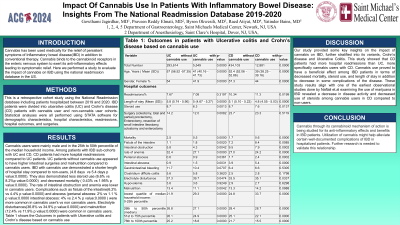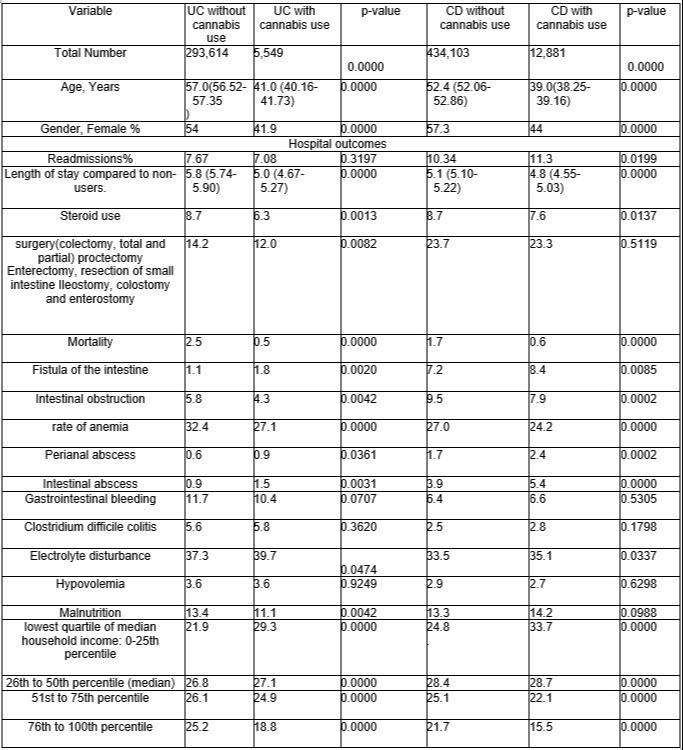Sunday Poster Session
Category: IBD
P0856 - Impact of Cannabis Use in Patients With Inflammatory Bowel Disease: Insights From the National Readmission Database 2019-2020
Sunday, October 27, 2024
3:30 PM - 7:00 PM ET
Location: Exhibit Hall E

Has Audio
- GK
Gowthami Sai Kogilathota Jagirdhar, MD
Saint Michaels Medical Center
Newark, NJ
Presenting Author(s)
Gowthami Sai Kogilathota Jagirdhar, MD1, Praveen Reddy Elmati, MD2, Byron Okwesili, MD1, Raed Atiyat, MD1, Yatinder Bains, MD3
1Saint Michaels Medical Center, Newark, NJ; 2Saint Clare's Health, New York Medical College, Dover, NJ; 3New York Medical College - Saint Michael's Medical Center, Newark, NJ
Introduction: Cannabis has been used medically for the relief of persistent symptoms of Inflammatory bowel disease(IBD) in addition to conventional therapy. Cannabis binds to the cannabinoid receptors in the enteric nervous system to exert its anti-inflammatory effects leading to symptomatic relief. Here we performed a study to evaluate the impact of cannabis on IBD using the national readmission database in the US.
Methods: This is a retrospective cohort study using the National Readmission database including patients hospitalized between 2019 and 2020. IBD patients were divided into ulcerative colitis (UC) and Crohn's disease (CD) patients with cannabis user and non-cannabis user cohorts. Statistical analyses were all performed using STATA software for demographic characteristics, hospital characteristics, readmissions, hospital outcomes, and surgeries. Figure 1 shows the outcomes in the patients on IBD using cannabis
Results: Cannabis users were mainly male and in the 25th to 50th percentile of the median household income. Among patients with IBD sub-cohorts with UC and CD, CD patients had more hospital readmissions compared to UC patients. UC patients without cannabis use appeared to have higher intestinal surgeries and malnutrition compared to cannabis users. IBD with cannabis use demonstrated a shorter length of hospital stay compared to non-users, (4.8 days vs 5.4 days p value:0.0000). They also demonstrated less steroid use (6.6% vs 8.2%p value:0.0000) and decreased mortality ( 0.43% vs 1.95% p value:0.0000). The rate of intestinal obstruction and anemia was lower in cannabis users. Complications such as fistula of the intestine(6.2% vs 4.4% p value:0.0000) and abscess (peranal abscess: 2% vs 1.1 % p value:0.0000 intestinal abscess: 4% vs 2.4 % p value:0.0000 ) were more common in cannabis users vs non cannabis users. Electrolyte disturbances(36.8% vs 34.9% p value:0.0000) and malnutrition (12.4% vs 11.9% p value:0.0000) were common in cannabis users
Discussion: Our study provided some key insights on the impact of cannabis on IBD, further stratified into its variants, Crohn’s disease and Ulcerative Colitis. Cannabis through its cannabinoid mechanism of action is being studied for its anti-inflammatory effects and benefits in IBD patients. Utilization of cannabis might help alleviate certain well-documented complications of IBD in hospitalized patients. Further research is needed to validate this relationship.

Disclosures:
Gowthami Sai Kogilathota Jagirdhar, MD1, Praveen Reddy Elmati, MD2, Byron Okwesili, MD1, Raed Atiyat, MD1, Yatinder Bains, MD3. P0856 - Impact of Cannabis Use in Patients With Inflammatory Bowel Disease: Insights From the National Readmission Database 2019-2020, ACG 2024 Annual Scientific Meeting Abstracts. Philadelphia, PA: American College of Gastroenterology.
1Saint Michaels Medical Center, Newark, NJ; 2Saint Clare's Health, New York Medical College, Dover, NJ; 3New York Medical College - Saint Michael's Medical Center, Newark, NJ
Introduction: Cannabis has been used medically for the relief of persistent symptoms of Inflammatory bowel disease(IBD) in addition to conventional therapy. Cannabis binds to the cannabinoid receptors in the enteric nervous system to exert its anti-inflammatory effects leading to symptomatic relief. Here we performed a study to evaluate the impact of cannabis on IBD using the national readmission database in the US.
Methods: This is a retrospective cohort study using the National Readmission database including patients hospitalized between 2019 and 2020. IBD patients were divided into ulcerative colitis (UC) and Crohn's disease (CD) patients with cannabis user and non-cannabis user cohorts. Statistical analyses were all performed using STATA software for demographic characteristics, hospital characteristics, readmissions, hospital outcomes, and surgeries. Figure 1 shows the outcomes in the patients on IBD using cannabis
Results: Cannabis users were mainly male and in the 25th to 50th percentile of the median household income. Among patients with IBD sub-cohorts with UC and CD, CD patients had more hospital readmissions compared to UC patients. UC patients without cannabis use appeared to have higher intestinal surgeries and malnutrition compared to cannabis users. IBD with cannabis use demonstrated a shorter length of hospital stay compared to non-users, (4.8 days vs 5.4 days p value:0.0000). They also demonstrated less steroid use (6.6% vs 8.2%p value:0.0000) and decreased mortality ( 0.43% vs 1.95% p value:0.0000). The rate of intestinal obstruction and anemia was lower in cannabis users. Complications such as fistula of the intestine(6.2% vs 4.4% p value:0.0000) and abscess (peranal abscess: 2% vs 1.1 % p value:0.0000 intestinal abscess: 4% vs 2.4 % p value:0.0000 ) were more common in cannabis users vs non cannabis users. Electrolyte disturbances(36.8% vs 34.9% p value:0.0000) and malnutrition (12.4% vs 11.9% p value:0.0000) were common in cannabis users
Discussion: Our study provided some key insights on the impact of cannabis on IBD, further stratified into its variants, Crohn’s disease and Ulcerative Colitis. Cannabis through its cannabinoid mechanism of action is being studied for its anti-inflammatory effects and benefits in IBD patients. Utilization of cannabis might help alleviate certain well-documented complications of IBD in hospitalized patients. Further research is needed to validate this relationship.

Figure: Figure 1: Outcomes in patients with Ulcerative colitis and Crohn’s disease based on cannabis use
Disclosures:
Gowthami Sai Kogilathota Jagirdhar indicated no relevant financial relationships.
Praveen Reddy Elmati indicated no relevant financial relationships.
Byron Okwesili indicated no relevant financial relationships.
Raed Atiyat indicated no relevant financial relationships.
Yatinder Bains indicated no relevant financial relationships.
Gowthami Sai Kogilathota Jagirdhar, MD1, Praveen Reddy Elmati, MD2, Byron Okwesili, MD1, Raed Atiyat, MD1, Yatinder Bains, MD3. P0856 - Impact of Cannabis Use in Patients With Inflammatory Bowel Disease: Insights From the National Readmission Database 2019-2020, ACG 2024 Annual Scientific Meeting Abstracts. Philadelphia, PA: American College of Gastroenterology.
